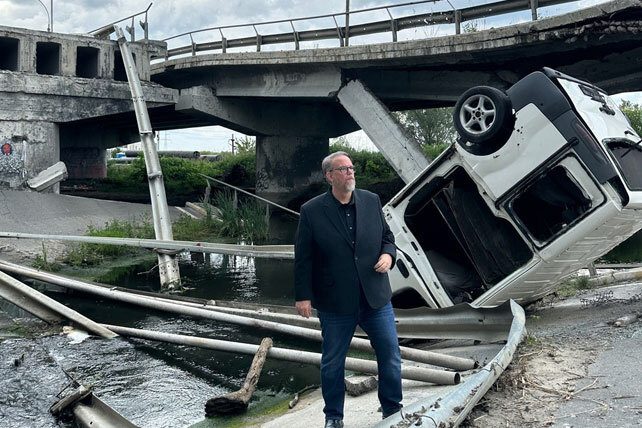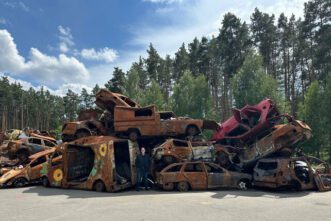“It was like a movie for us, but it was reality.”
That’s how my friend Ruslan Khmyz described the Russian invasion of his home nation and the threat to his city. Everything changed on February 24, 2022, when Ukraine’s neighbors pushed into Ukrainian land with jets, tanks, and troops, with a single, savage goal: take the capital city of Kyiv and topple the Ukrainian government. The world, me included, expected the Russian forces to make quick work of it. But the Ukrainians pushed back with brave resilience. They severed the main artery into Kyiv, blowing up the Irpin Bridge and holding the line. The Russians eventually retreated from the capital, yet the war continues.
More than two years in, visiting Kyiv can feel almost normal, almost like visiting the other European cities in nations nearby. But it’s clearly still different. Air traffic isn’t allowed, so after teaching as a visiting scholar at Wycliffe Hall in Oxford, England, then speaking at the European Leadership Forum in Poland, I crossed into Ukraine by car, driving hours into the city of Kyiv. As the Dean of the Talbot School of Theology, I had the privilege of visiting leaders at our extension center there, along with our partners at Kyiv Theological Seminary (KTS).
Traveling with me was Talbot professor Mark Saucy, who helped start (and now directs) our Kyiv center. The extension has trained men and women for gospel ministry for almost two decades, coming alongside KTS as their master’s degree partner. Ruslan is now the president of KTS, and I learned a lot from him and other Ukrainian leaders like KTS professor Eduard Borysov as I experienced life inside Ukraine two years after Russia brought war into the land. I want to share some of the sobering and encouraging things God is doing in Ukraine and through the church and Christians there. Specifically, we can be challenged by the resilience, the ministry, and the encouragement of Ukrainian Christians.
The Resilience of Ukrainian Christians
Over and over, I was stunned by the resilience of Ukrainians in general and Ukrainian Christians and pastors specifically. On several nights we woke up to warning sirens about incoming cruise missiles or drone strikes that put the whole nation under missile alert. One time the alerts just came an hour before our pastors’ conference. People just kept going. In fact, Eduard explained that he disabled the alerts on his phone, because he decided with his wife and small child, “We trust the Lord, and if we die, we die together as a family.”
Makeshift memorials, official and unofficial ones, dot the landscape. Maidan Square in downtown Kyiv has tens of thousands of flags, one for every soldier killed in the brutal Russian invasion. Outside of Kyiv on the M06/E40 highway, dozens of burned-out cars stack together, painted now with angels’ wings to honor the hundreds of civilians killed by Russian soldiers who had been stopped in their advance on the capitol.
The attack that woke us up on June 1 turned out to be one of the larger strikes in the last few month—about 100 drones and missiles. For context, Iran’s strike on Israel—which led the global news—was 200. Yet this was just one day’s strike for Ukraine. At the front, the war is every day. Tens of thousands of Ukrainian soldiers have died, along with tens of thousands of Ukrainian civilians. Russia attacks regularly. While many Americans may think the war is over, it’s nowhere close.
Yet the Ukrainians keep going, and the Ukrainian Christians keep showing and sharing the love of Jesus. I spoke with a young lady, Anna, who graduated from Talbot’s extension center and now teaches at KTS. Anna said the moment is a challenge, but also a chance for God to be revealed in Christians’ hearts and in Ukrainian society. She said, “No crisis cancels God’s calling. War doesn’t cancel God’s calling.” Ukrainian Christians continue to do ministry, even and especially during this period of war.
The Ministry of Ukrainian Christians
Reports have popped up all over Ukraine about how the gospel is going forth in the last two years. Ruslan’s church is now about 700 people, and he said that 75% of the church is made up of new members and new followers of Jesus. It reminds me of what Eusebius said of the Christians in the earliest centuries of the church, how their ““deeds were on everyone’s lips, and they glorified the God of the Christians.”
Christians and churches in western Ukraine, furthest from the front on the eastern border with Russia have swung their doors and lives open to refugees. They have housed, fed, and served hundreds and thousands.
American Christians need to remember and pray for our brothers and sisters in Ukraine. The war isn’t over just because it’s no longer the “current thing” in the American consciousness. We need to pray for the many laborers that God is raising up for his harvest to meet the needs of Ukrainian ministry, especially the need for qualified Christian leaders among Ukrainian refugee communities. We can give toward the ministries that are serving Ukrainians, including to our work through Talbot.


